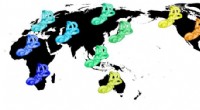
Wetenschap
Bij het beoordelen van COVID-plannen plaatsen mensen een feestje boven het beleid

Krediet:Pixabay/CC0 publiek domein
Als een politicus die we leuk vinden een COVID-19-beleid steunt, zijn we geneigd het te steunen. Maar wanneer een politieke vijand exact hetzelfde plan onderschrijft, hebben we de neiging om ons ertegen te verzetten, volgens nieuw onderzoek van de Universiteit van Colorado Boulder op 14 januari in de Proceedings of the National Academy of Sciences .
Op een meer optimistische toon:de wereldwijde studie suggereert dat terwijl politici over de hele wereld de publieke opinie hebben gepolariseerd tijdens de pandemie, vertrouwde wetenschappelijke experts misschien de macht hebben om deze te verenigen.
"Deze studie toont aan dat als het gaat om COVID-19, net als bij andere hedendaagse problemen, mensen zich veel meer laten beïnvloeden door wie het beleid vertegenwoordigt dan wat het beleid eigenlijk is", zegt senior auteur Leaf Van Boven, hoogleraar psychologie en neurowetenschappen bij CU Boulder. "Het laat ook zien dat mensen experts meer vertrouwen en aardig vinden dan politici, zelfs die van hun eigen partij."
Politici polariseren, experts depolariseren
Voor de studie, uitgevoerd tussen augustus en november 2020, presenteerden Van Boven en zijn co-auteurs een enquête aan een nationaal representatieve steekproef van 13.000 mensen in zeven landen:Brazilië, Israël, Italië, Zweden, Zuid-Korea, het Verenigd Koninkrijk en de Verenigde Staten.
Respondenten, waaronder 3.300 in de Verenigde Staten, werd gevraagd om een van de twee voorstellen voor pandemiebeheersing te evalueren, op basis van echte plannen die in overweging worden genomen, waaronder maatregelen zoals sociale afstand, voorschriften op de werkplek, contactopsporing en reisbeperkingen.
Een daarvan omvatte strengere beperkingen en gaf prioriteit aan "het laag houden van het aantal COVID-19-gevallen". Een ander benadrukte "zoveel mogelijk herstel van de economie en het voorkomen van een heropleving van COVID-19-gevallen."
In een vervolgexperiment, dat alleen in de Verenigde Staten werd uitgevoerd, evalueerden respondenten internationale plannen voor de distributie van vaccins, waarbij de ene prioriteit gaf aan een America-first-strategie en een andere een meer globale aanpak hanteerde.
In both experiments, respondents were told that the policy was supported by either liberal elites, conservative elites, a bipartisan coalition, or nonpartisan scientific experts.
Names of elites were adapted for each country. For instance, in the U.S. survey, the policy was said to be endorsed by either Donald Trump or Joe Biden; In Brazil, it was endorsed by Brazilian President Jair Bolsonaro or his political rival, Fernando Haddad.
Across all countries, liberal and conservative respondents were significantly more likely to support a policy when told elites from their party endorsed it. When a policy was presented as backed by bipartisan coalitions or neutral experts, it earned the most support.
"These findings underscore how important it is to have communications come from scientific sources that are not seen as political and to keep prominent politicians out of the spotlight of crisis communication," said co-first author Alexandra Flores, a Ph.D. student in the Department of Psychology and Neuroscience.
How nonpartisan experts can help
In previous research on climate change policies, Van Boven found similar results:Republicans and Democrats had more in common than assumed and based their support more on who backed a policy than what it said.
But Van Boven was surprised to find that such political polarization has persisted so broadly, even in the face of an unprecedented global crisis requiring urgent, coordinated action.
"In the beginning of the pandemic, a lot of scholars predicted that these political divisions would be tempered, and we would all band together to confront this shared threat. That has not been the case," said Van Boven.
The United States was not, as often assumed, the most politically polarized country assessed. Sweden, Italy and Brazil were at least as politically divided, the study found, while the United Kingdom was less polarized.
As the pandemic enters its third year, the authors hope the findings will encourage politicians to pull away from the microphone and let scientific experts, disentangled from political infighting, take the lead on communicating health policies.
"When communication comes from politicians before the public really gets a chance to evaluate the relevant goals and outcomes, it can politicize things quickly and contribute to a spirit of uncooperativeness," said Flores. "A good way to combat that is to have nonpartisan experts be the ones to weigh in first."
They also hope individuals will take a hard look at why they do or don't support plans.
"In many situations, political polarization is a headache that slows things down," said Van Boven. "But in the context of this pandemic, it is costing hundreds of thousands of lives."
 Hoe Covalent Compounds
Hoe Covalent Compounds Neutronen onthullen verborgen geheimen van het hepatitis C-virus
Neutronen onthullen verborgen geheimen van het hepatitis C-virus Studie onthult continu pad naar bouwstenen van het leven
Studie onthult continu pad naar bouwstenen van het leven Onderzoekers ontwikkelen snelle en nauwkeurige methode voor het opsporen van middelen voor chemische oorlogsvoering
Onderzoekers ontwikkelen snelle en nauwkeurige methode voor het opsporen van middelen voor chemische oorlogsvoering Ontwikkeling van ultradun duurzaam membraan voor efficiënte scheiding van olie en water
Ontwikkeling van ultradun duurzaam membraan voor efficiënte scheiding van olie en water
 Sneeuwchaos in Europa veroorzaakt door smeltend zee-ijs op de Noordpool
Sneeuwchaos in Europa veroorzaakt door smeltend zee-ijs op de Noordpool Zeemissie VS-Cuba vindt gezonde riffen, invasieve koraalduivel
Zeemissie VS-Cuba vindt gezonde riffen, invasieve koraalduivel Chinas EarthLab begint met proeven als eerste faciliteit van het land die interacties met het aardsysteem onderzoekt
Chinas EarthLab begint met proeven als eerste faciliteit van het land die interacties met het aardsysteem onderzoekt Beweging van regenwoudvlinders beperkt door oliepalmplantages
Beweging van regenwoudvlinders beperkt door oliepalmplantages Verontreinigende stoffen van bosbranden beïnvloeden de groei van gewassen en vegetatie honderden kilometers van de impactzone
Verontreinigende stoffen van bosbranden beïnvloeden de groei van gewassen en vegetatie honderden kilometers van de impactzone
Hoofdlijnen
- Gebruiken paddenstoelen echt taal om met elkaar te praten? Een schimmelexpert onderzoekt
- Celstructuurdefinities
- Cel Life Functies
- Waar vindt ademhaling plaats?
- USDA verstrooiende rabiësvaccins voor dieren in het wild in 13 staten
- Recordaantal walvissen geteld in Patagonië in Argentinië
- Hoe vogels onderscheiden waar een bepaald geluid vandaan komt
- De effecten van zoutconcentratie op bacteriegroei
- Kaketoes die bakken openen, gaan de wapenwedloop met mensen aan
- Hulpvragen voor huiselijk geweld namen met 20% toe tijdens de pandemie

- Meerderheid managers aarzelt om sollicitanten met psychische problemen aan te nemen

- Jura-dinosaurussen draafden tussen Afrika en Europa

- Menselijk benig labyrint gebruikt als indicator voor verspreiding vanuit Afrika

- Hoe stress de prestaties en het concurrentievermogen beïnvloedt tussen mannen en vrouwen

 Onderzoekers ontwikkelen snelle, zeer nauwkeurige test om virussen zoals SARS-COV-2 . te detecteren
Onderzoekers ontwikkelen snelle, zeer nauwkeurige test om virussen zoals SARS-COV-2 . te detecteren  Wat is een draadkabel-reeving-systeem?
Wat is een draadkabel-reeving-systeem?  Gezichtsbeschermers, maskers met kleppen niet effectief tegen verspreiding van COVID-19:studie
Gezichtsbeschermers, maskers met kleppen niet effectief tegen verspreiding van COVID-19:studie De emotionele gehechtheid van familieleden beperkt de groei van het familiebedrijf
De emotionele gehechtheid van familieleden beperkt de groei van het familiebedrijf De bah-factor duwt een regering opnieuw in de richting van ontzilting, maar de geschiedenis suggereert dat het tijd is voor gerecycled water
De bah-factor duwt een regering opnieuw in de richting van ontzilting, maar de geschiedenis suggereert dat het tijd is voor gerecycled water Automatische isolatie van apparaatstuurprogramma's beschermt tegen bugs in besturingssystemen
Automatische isolatie van apparaatstuurprogramma's beschermt tegen bugs in besturingssystemen Verschil tussen samengestelde en ontlede microscopen
Verschil tussen samengestelde en ontlede microscopen Identificatietechnologie zwaait om zich te concentreren op hartslag
Identificatietechnologie zwaait om zich te concentreren op hartslag
- Elektronica
- Biologie
- Zonsverduistering
- Wiskunde
- French | Italian | Spanish | Portuguese | Swedish | German | Dutch | Danish | Norway |

-
Wetenschap © https://nl.scienceaq.com

